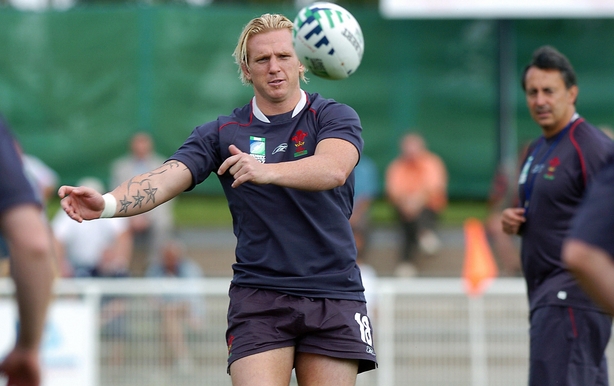It was former Wales international Alix Popham's wife Mel who convinced him to visit a doctor in the autumn of 2019.
She'd seen worrying changes in his behaviour that convinced her something was wrong.
An increasingly poor short-term memory, mixing up words, forgetting conversations they'd had 20 minutes earlier and bad concentration were all red flags.
But it was the emotional outbursts, the irritability, that really concerned her. Alix had been an optimistic, happy-go-lucky person in all the time she'd known him - and she knew him a long time. The pair were at school together, friends long before they became a married couple.
Confirmation of his illness still came as an emormous, life-changing shock though. Alix, at just 41 years old, was diagnosed with having a traumatic brain injury, early onset dementia and probable chronic traumatic encephalopathy.
"When I had my diagnosis in April, I had sat on this for nine, 12 months, not spoken to my parents, Mel's parents, my brothers and sister," Popham told RTÉ's Game On.
"I just though to myself, 'I can't be going through this alone'. Speaking to boys I played with, it turned out that I wasn't.
"Unfortunately there's quite a few boys struggling and it's about helping those. That's what the foundation is about because all the information out there on dementia is for grandads, people 60-plus, not for 40-year-olds."
Former Wales international Alix Popham and his wife Mel detail the stark statistics regarding the cumulative concussions he suffered during his career on @GameOn2FM
— RTÉ Rugby (@RTErugby) January 26, 2021
Full interview: https://t.co/TDfe8mIYbC #rterugby pic.twitter.com/y7iCjxWBut
The foundation he references is Head for Change, a new charity launched by the families of former football and rugby players who have been diagnosed with dementia. In March Popham, cyclist Geraint Thomas, and around a hundred ex-rugby pros will take part in a 24-hour virtual cycle ride to raise funds.
Popham won 33 caps for Wales between 2003 and 2008. Doctors estimate he suffered an astounding 100,000 sub-concussions throughout his playing career.
He's part of a group of former internationals who are planning legal action for negligence against World Rugby, the Rugby Football Union and the Welsh Rugby Union over brain injuries they have suffered.
The players have also created 15 'commandments' which they feel World Rugby should adopt to make the game safer.
"Its the analytics of Alix's playing career," adds Mel. "It's not just the matches. Concussions occurred in contact in training. It has a cumulative effect ultimately. 85% of those 100,000 concussions they estimate occurred in training.
"When I ran the maths on that, I thought hang on, 'there's something we can do here and do very quickly and easily in rugby without hugely affecting the game on a Saturday but to protect the players'.
"The brain is the person ultimately. Without that, there is no person."

Popham doesn't drink and he's changed his eating habits too to try and delay the impact of the illness.
He is facing up to a long, difficult battle, but he refuses to be downbeat.
"I've changed my diet to a 95% Mediterranean diet so I'm only allowed one steak a week," he says.
"I've signed up to an Iron Man, and that has a big benefit for my wellbeing and also the blood flow and the oxygen going to the brain. Hopefully that will slow down the progression of this. I'm just trying to look at this as positive as possible.
"I can't really remember a lot of my career. I just knew that if you did take the bang and you weren't out, you just had a bit of light-headedness, you had some sniffing salts and carried on.
"That's what was done when I was playing. I just think for what we want to get across it's to limit as much of the contact that the boys are still doing as possible and this hopefully won't happen to as many boys in future.
"We want to bring in MOTs for players so when they sign a first professional contract they get tested the whole body and included in that is the brain scan. Every year that's done, like boxers have. That will make the game safer."

